|
|
|
Sort Order |
|
|
|
Items / Page
|
|
|
|
|
|
|
| Srl | Item |
| 1 |
ID:
132634
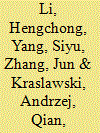

|
|
|
|
|
| Publication |
2014.
|
| Summary/Abstract |
To alleviate the problem of the insufficient reserves of natural gas in China, coal-based synthetic natural gas (SNG) is considered to be a promising option as a source of clean energy, especially for urban use. However, recent study showed that SNG will not accomplish the task of simultaneous energy conservation and CO2 reduction. In this paper, life cycle costing is made for SNG use in three main applications in residential sector: heating, household use, and public transport. Comparisons are conducted between SNG and coal, natural gas, liquefied petroleum gas (LPG), diesel, and methanol. The results show that SNG is a competitive option only for household use. The use of SNG for heating boilers or city buses is not as cost-effective as expected. The biggest shortcoming of SNG is the large amount of pollutants generated in the production stage. At the moment, the use of SNG is promoted by the government. However, as shown in this paper, one can expect a transfer of pollution from the urban areas to the regions where SNG is produced. Therefore, it is suggested that well-balanced set of environmental damage-compensating policies should be introduced to compensate the environmental losses in the SNG-producing regions.
|
|
|
|
|
|
|
|
|
|
|
|
|
|
|
|
| 2 |
ID:
123704
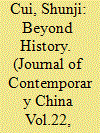

|
|
|
|
|
| Publication |
2013.
|
| Summary/Abstract |
This article takes the proposition that cooperation in the area of non-traditional security (NTS) can provide the essential window of opportunity for Northeast Asians to move beyond history. To demonstrate, it explores the development of NTS cooperation in Northeast Asia, paying particular attention to Sino-Japanese cooperation in the environmental and disaster areas. It then examines the relationship between NTS cooperation and the construction of a regional international society in Northeast Asia. It argues that the importance of NTS cooperation is twofold. First, in a region where historical animosities remain high, NTS issues can avoid sensitive areas and find common ground for cooperation that traditional security approaches would be unable to envisage. Second, NTS cooperation has turned people-to-people relations in a more prominent and conciliatory direction, and enhanced human security consideration, thus taking things further than the indirect consequences of functionalism.
|
|
|
|
|
|
|
|
|
|
|
|
|
|
|
|
| 3 |
ID:
178656
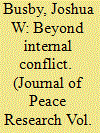

|
|
|
|
|
| Summary/Abstract |
The field of climate and security has matured over the past 15 years, moving from the margins of academic research and policy discussion to become a more prominent concern for the international community. The practice of climate and security has a broad set of concerns extending beyond climate change and armed conflict. Different national governments, international organizations, and forums have sought to mainstream climate security concerns emphasizing a variety of challenges, including the risks to military bases, existential risks to low-lying island countries, resource competition, humanitarian emergencies, shocks to food security, migration, transboundary water management, and the risks of unintended consequences from climate policies. Despite greater awareness of these risks, the field still lacks good insights about what to do with these concerns, particularly in ‘fragile’ states with low capacity and exclusive political institutions.
|
|
|
|
|
|
|
|
|
|
|
|
|
|
|
|
| 4 |
ID:
130300


|
|
|
|
|
| Publication |
2014.
|
| Summary/Abstract |
Genetically engineered (GE) foods apply new molecular technologies to agriculture. Widely adopted in the United States, Brazil and Argentina for the production of cons, soybeans, and cotton, they are practically banned in Europe and tightly regulated throughout the world. We have found that GE foods have significantly increase supplies cons, soybeans, and cotton, and lowered their prices, Thus improving food security, GE foods have already contributed to a reductions in the use of pesticides and emissions of greenhouse gases.
|
|
|
|
|
|
|
|
|
|
|
|
|
|
|
|
| 5 |
ID:
080777
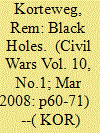

|
|
|
|
|
| Publication |
2008.
|
| Summary/Abstract |
The 9/11 attacks demonstrated the strategic importance of terrorist sanctuaries. Aside from sanctuaries provided by host-states, ungoverned areas around the world are exploited by terrorist organizations resulting in terrorist black holes. This article explores the synergy between ungoverned areas and terrorist groups. State failure is not sufficient to explain the creation of these black holes, specific comparative advantages of an area to attract terrorist groups must be taken into account. Seven elements of comparative advantage are introduced of which lack of governmental control is salient. Finally, the possibility of terrorist black holes existing in the West is assessed
|
|
|
|
|
|
|
|
|
|
|
|
|
|
|
|
| 6 |
ID:
021932
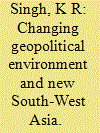

|
|
|
|
|
| Publication |
Oct-Dec 2001.
|
| Description |
363-379
|
|
|
|
|
|
|
|
|
|
|
|
|
|
|
|
| 7 |
ID:
072963
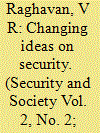

|
|
|
| 8 |
ID:
127299
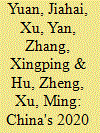

|
|
|
|
|
| Publication |
2014.
|
| Summary/Abstract |
China has proposed its 2020 clean energy target together with the climate change target of reducing CO2 intensity of the economy by 40-45% below the 2005 level. This article investigates the feasibility of these targets by testing their consistency under possible economic development scenarios. We analyse these targets from two perspectives: consistency with the overall economic growth and consistency with the international society's expectation on China's greenhouse gas (GHG) abatement responsibilities. The main findings are: under the recently announced 2020 target of gross domestic product (GDP) that is double the 2010 level, the adoption of a 15% clean energy target could result in excessive primary energy demand; and then with 40-45% GDP CO2 intensity reduction, CO2 emissions in 2020 could substantially exceed the International Energy Agency (IEA) 450 ppm scenario for China. Thus we propose a 17% clean energy target that can reconcile the domestic plan with international expectation. Our article also outlines the pathways to realise clean energy development into 2020 and proposes policy recommendations.
|
|
|
|
|
|
|
|
|
|
|
|
|
|
|
|
| 9 |
ID:
106496
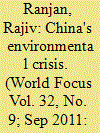

|
|
|
| 10 |
ID:
127279
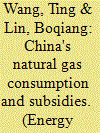

|
|
|
|
|
| Publication |
2014.
|
| Summary/Abstract |
China's natural gas consumption is growing rapidly and it has being driven by economic growth, industrialization and urbanization. In addition, the country's low-carbon development strategy, government-controlled gas price, and some other factors also contribute to the surging gas consumption. This paper studies China's natural gas consumption in residential, industrial and commercial sectors. We adopt the cointegration test and error correction model to study the relationships of explanatory factors and gas consumption of different sectors and climate factor is included into the analysis. In order to find the direction of natural gas pricing reform and establish the benchmark gas price, this paper also estimates the size of gas price subsidy by using price-gap approach. Our findings are as follows: In the long term, China's residential sector is more sensitive to price than the other two. Urbanization is an important factor promoting industrial and commercial gas consumption. Prices of other energies have an influence on natural gas consumption significantly due to the substitutability between energies. The slow-moving and unsatisfying pricing reforms on refined oil and natural gas lead to positive price elasticity of natural gas in the commercial sector, which implies that a further energy price reform is still stringent for China.
|
|
|
|
|
|
|
|
|
|
|
|
|
|
|
|
| 11 |
ID:
128743
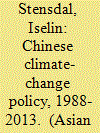

|
|
|
|
|
| Publication |
2014.
|
| Summary/Abstract |
China's domestic climate-change policy has changed remarkably since 1988. In the late 1980s, the central government viewed climate change as a highly scientific, foreign affairs issue, and any policies were limited to scientific investigations. A mere decade later, climate change was seen as a developmental issue. By 2007 climate change had become a national priority. Since then, climate-change policies have expanded in measure and in scope. In this article I employ the advocacy coalition framework (ACF) to explain the policy changes. The ACF takes into account the overall sophistication of socioeconomic conditions in China as well as the climate-change advocacy coalition's communications and active use of their amassed knowledge to influence policy.
|
|
|
|
|
|
|
|
|
|
|
|
|
|
|
|
| 12 |
ID:
122255
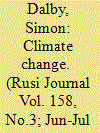

|
|
|
|
|
| Publication |
2013.
|
| Summary/Abstract |
Climate change has added new impetus and urgency to the long-running discussion of environmental security, leading to an emphasis on the overall transformation of planetary systems. In this article, Simon Dalby argues that this requires consideration of three themes in particular: urban vulnerabilities to extreme events; the unforeseen social and political consequences of adaptation and mitigation efforts; and the possibilities of geo-engineering. Furthermore, given the increasingly artificial circumstances that the global economy is creating, security planners should now focus on the consequences of further expansion of the carbon-fuelled global economy, rather than on concerns about political instabilities in the rural peripheries caused by resource conflicts.
|
|
|
|
|
|
|
|
|
|
|
|
|
|
|
|
| 13 |
ID:
122430
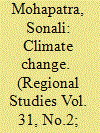

|
|
|
| 14 |
ID:
099160
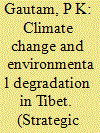

|
|
|
|
|
| Publication |
2010.
|
| Summary/Abstract |
Both the Chinese government and the Tibetans are in agreement over the impending issues relating to the adverse impact of climate change on Tibet while the India-specific data on glacier melt is as yet inconclusive. There is, however, a difference of perception in Sino-Tibetan discourse over the capitalist model of economic development being undertaken by China which is at variance with the cultural practices of Tibetans, informed and regulated as they are with the Buddhist values of oneness with nature. Nomadism is also fundamental to the preservation of the ecology of Tibet. The Chinese policy of encouraging non-Tibetan influx of population, greater than the sustainable carrying capacity of Tibet, is enhancing the danger of an ecological meltdown. Due to ecological interconnectedness and interdependence, the article argues that Tibet, the water tower of Asia, should be preserved as a regional if not a global common for the sake of south Asian security.
|
|
|
|
|
|
|
|
|
|
|
|
|
|
|
|
| 15 |
ID:
090654
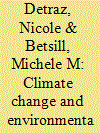

|
|
|
|
|
| Publication |
2009.
|
| Summary/Abstract |
This article explores the implications of the April 2007 United Nations Security debate on the security dimensions of a changing climate for international climate change politics. Specifically, our analysis focuses on whether and how security concerns have been addressed in past international political debates on climate change and considers whether the Security Council debate, which emphasized the threat of climate-related conflict, reflects a discursive shift. We elaborate on two general discourses on the relationship between environment and security, which we call environmental conflict and environmental security. Using content and discourse analysis, we demonstrate that both the historical climate change debate and the more recent Security Council debate have been informed by the environmental security discourse, meaning that a discursive shift has not taken place. We conclude by considering the possibility of a future discursive shift to the environmental conflict perspective and argue that such a shift would be counterproductive to the search for an effective global response to climate change.
|
|
|
|
|
|
|
|
|
|
|
|
|
|
|
|
| 16 |
ID:
129636
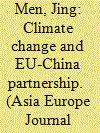

|
|
|
|
|
| Publication |
2014.
|
| Summary/Abstract |
Both the EU and China are important participants in the United Nations Framework Convention on Climate Change and the Kyoto Protocol. The EU's reliance on legally binding rules and institutions demonstrates its strong belief on institutionalism. While interstate cooperation is certainly necessary, implementation of any international agreement and most of the work needs to be done within a state. Henceforth, an uneasy balance between national interests and international responsibility has to be maintained. In the case of EU-China partnership, the carbon aviation tax issue serves as a good example to examine the realist-institutionalist struggle. Although it is still too early to tell if the EU and China would overcome their major disagreements in the field of climate change, there is reason to believe that an international agreement may be reached by 2015.
|
|
|
|
|
|
|
|
|
|
|
|
|
|
|
|
| 17 |
ID:
091244
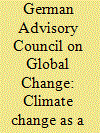

|
|
|
|
|
| Publication |
London, Earthscan, 2008.
|
| Description |
xviii, 248p.
|
| Standard Number |
9781844077618
|
|
|
|
|
|
|
|
|
|
|
|
Copies: C:1/I:0,R:0,Q:0
Circulation
| Accession# | Call# | Current Location | Status | Policy | Location |
| 054369 | 355.95160943/GER 054369 | Main | On Shelf | General | |
|
|
|
|
| 18 |
ID:
133271
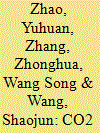

|
|
|
|
|
| Publication |
2014.
|
| Summary/Abstract |
In light of the growth in vertically specialized in global trade, the present paper uses input- output tables from the World Input-Output Database to construct an environmental multi-regional input-output model to calculate the CO2 emissions embodied in China's international trade during 1995-2009. The advantage of this model lies in its incorporation of the re-exported CO2 emissions component embodied in trade and its ability to differentiate domesticsourced CO2 emissions from foreign-sourced CO2 emissions in trade. The results show that carbon emissions embodied in both China's exports and imports increased significantly during 1995-2009. One important reason for this is that the re-exported carbon emissions embodied in China's imported intermediate inputs increased substantially during this period. Our research reveals that accelerating the transformation of trade pattern and upgrading processing trade should be emphasized in the formulation of policy to prompt CO2 emissions abatement in China.
|
|
|
|
|
|
|
|
|
|
|
|
|
|
|
|
| 19 |
ID:
128283
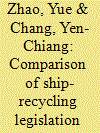

|
|
|
|
|
| Publication |
2014.
|
| Summary/Abstract |
This article discusses the Chinese legal framework in relation to ship recycling and suggests that the various legislation, standards, and opinions provide disorderly and nosystematic regulation. A uniform law specifically regulating the ship-recycling industry should be adopted by China, with a single competent authority empowered to supervise ship-recycling activities, that will effectively implement the 2009 Hong Kong International Convention for the Safe and Environmentally Sound Recycling of Ships.
|
|
|
|
|
|
|
|
|
|
|
|
|
|
|
|
| 20 |
ID:
129096


|
|
|
|
|
| Publication |
2014.
|
| Summary/Abstract |
The categorization of displaced people is grounded in criteria enshrined by international and regional conventions as well as receiving states' asylum and immigration policies. However, drawing distinctions between displaced people remains a controversial issue because the causes of displacement are more diverse than the categories assigned. Whilst various categories confer different rights and entitlement, the forcibly displaced are often obliged to aspire to particular identities driven by their resettlement livelihood objectives. This paper is based on a study carried out in Brazzaville, Republic of Congo and Newcastle upon Tyne, United Kingdom. The paper argues that the institutional and policy environments in the locations where resettlement is sought determine the way displaced people identify themselves in displacement and how they appraise their circumstances and their consequent adaptive livelihood reconstruction strategies. Furthermore, it is shown here that formalized displacement categorization adds complexity to the way displaced people must deal with their circumstances and negatively impacts on livelihood adaptation. Whilst categorization may serve perceived institutional needs, this study finds that displaced people's self-identification makes them resilient and enables survivability.
|
|
|
|
|
|
|
|
|
|
|
|
|
|
|
|
|
|
|
|
|